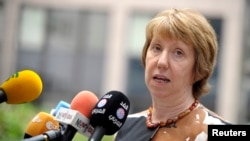European Union leaders have approved sending arms to Kurdish forces who are battling Islamic extremists in northern Iraq.
At an emergency meeting in Brussels Friday, EU foreign ministers did not agree that all member states would send weapons, but welcomed the decision by individual countries to do so.
France is already arming the Kurds. British Foreign Secretary Philip Hammond says London will likely also send weapons, while German Foreign Minister Frank-Walter Steinmeier says Germany will do "whatever is legally and politically possible."
Hammond says the European Council's conclusions Friday "will show the commitment of European countries to pushing back against the threat" of Islamic State militants, who have taken over large parts of northwestern Iraq.
The meeting in Brussels came a day after embattled Iraqi Prime Minister Nouri al-Maliki gave into international pressure to step aside and support his nominated replacement, Haider al-Abadi.
EU foreign policy chief Catherine Ashton said Friday, ahead of the ministers' meeting, that the bloc is "pleased" about the presence of al-Abadi and hopes to see "greater political stability now in Iraq."
Pressure has been building on the EU to help stop the Islamic State offensive in Iraq. Many warn the militants could eventually use the territory to launch attacks on the West.
But the EU has been split on how to handle the crisis. Some nations, including Britain and France, have followed the United States' lead in helping arm the outmanned Kurdish forces. The U.S. has also been conducting air strikes against the militants.
Other countries, including Germany, have been reluctant to involve themselves in the conflict, preferring instead to send humanitarian aid.
raq's military has proven unable to deal with the Sunni extremists. Maliki, a Shi'ite, is widely accused of failing to unite Iraq's fractious Sunni, Kurdish and Shi'ite communities during his eight-year tenure.
In what was viewed as a major political breakthrough on Thursday, Maliki pledged his full support for al-Abadi.
"I can say to you, the honorable Iraqi people, that I do not want any post, but my great post is your confidence in me and today I declare in front of you that in order to facilitate the political process and to form a new government, I am relinquishing my candidacy for the sake of my fellow, Mr. Haider al-Abadi, in order to save the high interest of the country," he said.
The White House late Thursday praised the political development, saying Maliki's backing of nominee Abadi marks "another major step forward in uniting the country." National Security Adviser Susan Rice noted statements of global support for Abadi.
United Nations Secretary-General Ban Ki-moon also welcomed the decision. In a statement, Ban said he looks forward to the "swift formation of an inclusive, broad-based government."
The Maliki resignation comes just three days after he took to the airwaves to announce he would not accept the Abadi nomination. Maliki and his backers argued that he was entitled to the nomination for a third term by law because his political bloc is the largest in parliament.
The U.S. Central (military) Command said Thursday that U.S. fighter jets and drones attacked and destroyed two heavily armed vehicles operated by militants who had been firing on Kurdish forces in the north. Authorities say one of the two airstrikes targeted an armored truck thought to have been supplied by U.S. forces to the Iraqi military and later captured by militants.
The latest U.S. strikes are the second such action in as many days. President Barack Obama said the strikes have broken the militant group's siege on a northern mountain where members of Iraq's religious and ethnic minorities had sought refuge.
Obama said the situation on Mount Sinjar has greatly improved, and said he does not believe an additional operation will be needed to evacuate the refugees.






